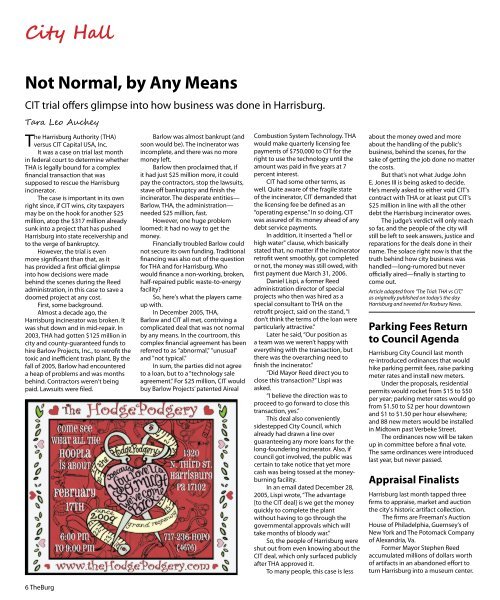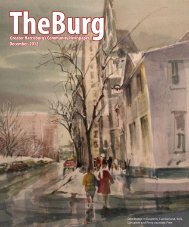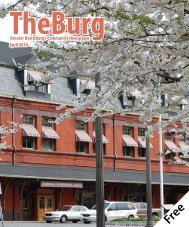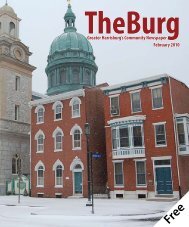February 2012 Greater Harrisburg's Community Newspaper - theBurg
February 2012 Greater Harrisburg's Community Newspaper - theBurg
February 2012 Greater Harrisburg's Community Newspaper - theBurg
Create successful ePaper yourself
Turn your PDF publications into a flip-book with our unique Google optimized e-Paper software.
City Hall<br />
Not Normal, by Any Means<br />
CIT trial offers glimpse into how business was done in Harrisburg.<br />
Tara Leo Auchey<br />
The Harrisburg Authority (THA)<br />
versus CIT Capital USA, Inc.<br />
It was a case on trial last month<br />
in federal court to determine whether<br />
THA is legally bound for a complex<br />
financial transaction that was<br />
supposed to rescue the Harrisburg<br />
incinerator.<br />
The case is important in its own<br />
right since, if CIT wins, city taxpayers<br />
may be on the hook for another $25<br />
million, atop the $317 million already<br />
sunk into a project that has pushed<br />
Harrisburg into state receivership and<br />
to the verge of bankruptcy.<br />
However, the trial is even<br />
more significant than that, as it<br />
has provided a first official glimpse<br />
into how decisions were made<br />
behind the scenes during the Reed<br />
administration, in this case to save a<br />
doomed project at any cost.<br />
First, some background.<br />
Almost a decade ago, the<br />
Harrisburg incinerator was broken. It<br />
was shut down and in mid-repair. In<br />
2003, THA had gotten $125 million in<br />
city and county-guaranteed funds to<br />
hire Barlow Projects, Inc., to retrofit the<br />
toxic and inefficient trash plant. By the<br />
fall of 2005, Barlow had encountered<br />
a heap of problems and was months<br />
behind. Contractors weren't being<br />
paid. Lawsuits were filed.<br />
Barlow was almost bankrupt (and<br />
soon would be). The incinerator was<br />
incomplete, and there was no more<br />
money left.<br />
Barlow then proclaimed that, if<br />
it had just $25 million more, it could<br />
pay the contractors, stop the lawsuits,<br />
stave off bankruptcy and finish the<br />
incinerator. The desperate entities—<br />
Barlow, THA, the administration—<br />
needed $25 million, fast.<br />
However, one huge problem<br />
loomed: it had no way to get the<br />
money.<br />
Financially troubled Barlow could<br />
not secure its own funding. Traditional<br />
financing was also out of the question<br />
for THA and for Harrisburg. Who<br />
would finance a non-working, broken,<br />
half-repaired public waste-to-energy<br />
facility<br />
So, here's what the players came<br />
up with.<br />
In December 2005, THA,<br />
Barlow and CIT all met, contriving a<br />
complicated deal that was not normal<br />
by any means. In the courtroom, this<br />
complex financial agreement has been<br />
referred to as "abnormal," "unusual"<br />
and "not typical."<br />
In sum, the parties did not agree<br />
to a loan, but to a “technology sale<br />
agreement.” For $25 million, CIT would<br />
buy Barlow Projects’ patented Aireal<br />
Combustion System Technology. THA<br />
would make quarterly licensing fee<br />
payments of $750,000 to CIT for the<br />
right to use the technology until the<br />
amount was paid in five years at 7<br />
percent interest.<br />
CIT had some other terms, as<br />
well. Quite aware of the fragile state<br />
of the incinerator, CIT demanded that<br />
the licensing fee be defined as an<br />
“operating expense.” In so doing, CIT<br />
was assured of its money ahead of any<br />
debt service payments.<br />
In addition, it inserted a "hell or<br />
high water" clause, which basically<br />
stated that, no matter if the incinerator<br />
retrofit went smoothly, got completed<br />
or not, the money was still owed, with<br />
first payment due March 31, 2006.<br />
Daniel Lispi, a former Reed<br />
administration director of special<br />
projects who then was hired as a<br />
special consultant to THA on the<br />
retrofit project, said on the stand, “I<br />
don’t think the terms of the loan were<br />
particularly attractive.”<br />
Later he said, “Our position as<br />
a team was we weren’t happy with<br />
everything with the transaction, but<br />
there was the overarching need to<br />
finish the incinerator.”<br />
“Did Mayor Reed direct you to<br />
close this transaction” Lispi was<br />
asked.<br />
“I believe the direction was to<br />
proceed to go forward to close this<br />
transaction, yes.”<br />
This deal also conveniently<br />
sidestepped City Council, which<br />
already had drawn a line over<br />
guaranteeing any more loans for the<br />
long-foundering incinerator. Also, if<br />
council got involved, the public was<br />
certain to take notice that yet more<br />
cash was being tossed at the moneyburning<br />
facility.<br />
In an email dated December 28,<br />
2005, Lispi wrote, “The advantage<br />
[to the CIT deal] is we get the money<br />
quickly to complete the plant<br />
without having to go through the<br />
governmental approvals which will<br />
take months of bloody war.”<br />
So, the people of Harrisburg were<br />
shut out from even knowing about the<br />
CIT deal, which only surfaced publicly<br />
after THA approved it.<br />
To many people, this case is less<br />
about the money owed and more<br />
about the handling of the public's<br />
business, behind the scenes, for the<br />
sake of getting the job done no matter<br />
the costs.<br />
But that’s not what Judge John<br />
E. Jones III is being asked to decide.<br />
He’s merely asked to either void CIT's<br />
contract with THA or at least put CIT’s<br />
$25 million in line with all the other<br />
debt the Harrisburg incinerator owes.<br />
The judge’s verdict will only reach<br />
so far, and the people of the city will<br />
still be left to seek answers, justice and<br />
reparations for the deals done in their<br />
name. The solace right now is that the<br />
truth behind how city business was<br />
handled—long-rumored but never<br />
officially aired—finally is starting to<br />
come out.<br />
Article adapted from "The Trial: THA vs CIT,"<br />
as originally published on today's the day<br />
Harrisburg and tweeted for Roxbury News.<br />
Parking Fees Return<br />
to Council Agenda<br />
Harrisburg City Council last month<br />
re-introduced ordinances that would<br />
hike parking permit fees, raise parking<br />
meter rates and install new meters.<br />
Under the proposals, residential<br />
permits would rocket from $15 to $50<br />
per year; parking meter rates would go<br />
from $1.50 to $2 per hour downtown<br />
and $1 to $1.50 per hour elsewhere;<br />
and 88 new meters would be installed<br />
in Midtown past Verbeke Street.<br />
The ordinances now will be taken<br />
up in committee before a final vote.<br />
The same ordinances were introduced<br />
last year, but never passed.<br />
Appraisal Finalists<br />
Harrisburg last month tapped three<br />
firms to appraise, market and auction<br />
the city's historic artifact collection.<br />
The firms are Freeman's Auction<br />
House of Philadelphia, Guernsey's of<br />
New York and The Potomack Company<br />
of Alexandria, Va.<br />
Former Mayor Stephen Reed<br />
accumulated millions of dollars worth<br />
of artifacts in an abandoned effort to<br />
turn Harrisburg into a museum center.<br />
6 TheBurg









